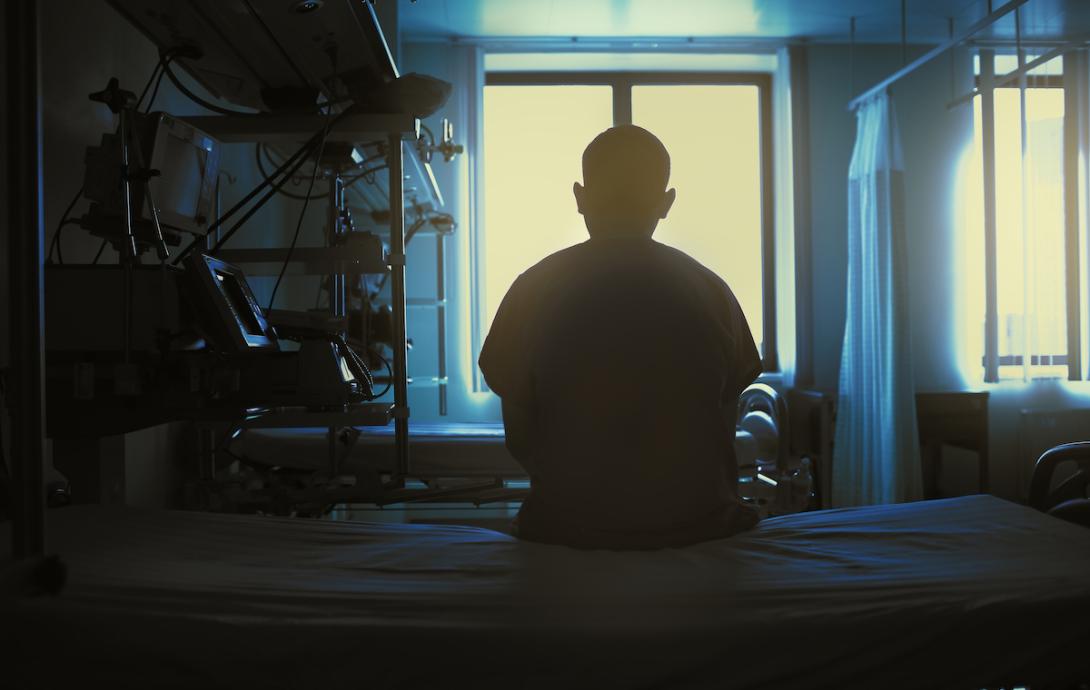
This article has been updated to incorporate comment from Oregon Health Authority.
For 54 years, Lane County’s dominant hospital system, PeaceHealth, has run a secure 35-bed behavioral health facility in downtown Eugene where people in severe crisis from schizophrenia, bipolar disorder or other mental illnesses can stay for days or weeks to stabilize.
It’s among the oldest such hospital-based units in the state, and the only one in the south Willamette Valley. Lane County residents have long taken its crucial services for granted.
But no more.
Under pressure from systemwide financial losses, Vancouver-based nonprofit PeaceHealth wants the 35-bed unit moved out of the aging PeaceHealth University District hospital complex in Eugene and to become a “community” responsibility. PeaceHealth has indicated it doesn’t want to indefinitely shoulder the $8 million to $10 million per year in operating losses it incurs running the unit with its specialized staff of about 100.
A state press release in December indicated the facility would stay open for now. But the situation puts a spotlight on a vital piece of Oregon’s behavioral health care safety net: the secure, in-patient psychiatric units that are run — typically at steep operating losses — by hospitals. With most of Oregon’s hospital systems driven into the red by the COVID-19 pandemic, hospital executives are increasingly scrutinizing the financial burden these units impose.
At a time when Gov. Tina Kotek and state lawmakers have made establishing additional treatment beds and psychiatric services a priority, the PeaceHealth situation raised another wrinkle: Will the state be able to keep the services it already has?

Around the state, 12 general hospitals have their own specialized in-house, in-patient secure psychiatric units. Collectively, they hold at least 256 behavioral health beds. The hospitals are not legally required to provide the service. It’s simply work they’ve opted to take on over the decades.
Publicizing the problem
However, hospitals can’t easily back out of the work. That’s in part because psychiatric care is a crucial professional medical responsibility. Plus, those psychiatric patients would likely switch to using hospital emergency rooms if they had nowhere else to go, experts said.
So, hospitals now are bent on publicizing and rectifying a long-standing imbalance: Reimbursement rates, especially those paid by Medicaid and Medicare, don’t come close to covering the true cost of running these labor-intensive facilities.
Part of that publicity stems from PeaceHealth’s announcement last summer that it intended to shut down the University District campus. PeaceHealth announced in August that it expected the “community” to come up with a “sustainable alternative” to the behavioral health unit in the hospital. PeaceHealth told the state it would try to keep the unit running only “to the extent it is viable under (insurance) reimbursement for the cost of care.”
“Hospitals should be in this business, and more of them should be in this business. Because mental health is health. It’s not separate from physical health. It’s not different. It’s part of our responsibility.”
In an interview, Lynnea Lindsey, director of PeaceHealth’s behavioral health services in Oregon, told The Lund Report that “We’ve helped to bring to the surface the concern that everybody has raised for many years … This is a really important issue to get out there.”
In a filing with the state, PeaceHealth said it expected insurance reimbursement revenues for the Eugene behavioral health unit to be $17 million to $18 million a year over the next three years, but that expenses, including salaries, supplies, dining, cleaning and security services and the like, would range from $25 million to $28 million a year, leading to annual operating losses of $8 million to $10 million.
Hospitals typically don’t tell the public such detailed information. But in this case, the numbers were included to support PeaceHealth’s application to the state to shift the license of the unit from University District to PeaceHealth’s RiverBend hospital in Springfield.

Robin Henderson, chief executive of behavioral health for the Providence hospitals in Oregon, said the pandemic has intensified hospital systems’ concerns about services that persistently lose money. At four of its Oregon hospitals, Providence has a total of 107 inpatient psychiatric beds.
Providence is committed to continuing the service, despite operating losses, Henderson told The Lund Report. At one of the units, operating expenses exceeded insurance payments by $1 million a year, she said.
Around the state “all of (the behavioral health units) operate at a loss, and have for many years,” she said. “But in a post-pandemic world, that’s not an (acceptable) reality. All health systems are losing money, including ours,” she said.
Yet there is no easy fix. That’s because many forces are involved in setting reimbursement rates paid to hospitals for inpatient behavioral health services. Depending on the type of insurance – Oregon Health Plan for low-income residents, Medicare for the elderly, or commercial insurance for people covered by their employer – upping reimbursement rates can involve federal Medicaid health care regulators, the Oregon Health Authority, the Oregon Legislature, regional insurers that administer the Oregon Health Plan, and commercial insurance companies.
More beds needed
What’s more, a state-funded consultant’s draft report issued earlier this month found the current number of hospital-based behavioral health beds falls far short of Oregon’s need.
According to the report released by the Oregon Health Authority, the state lacks a wide range of residential facilities to care for people struggling with mental health and substance use issues, those going through drug and alcohol withdrawal, and others who need intensive supervised residential medical care.
Inpatient hospital behavioral health units in Oregon*
General hospitals with inpatient behavioral health units
Asante Rogue Regional Medical Center, Medford: 24 adult beds
Bay Area Hospital, Coos Bay: 13 adult beds
Good Samaritan Regional Medical Center, Corvallis: 16 beds
Mercy Medical Center, Roseburg: 12 beds (to open this spring)
Oregon Health & Science University Hillsboro Medical Center: 21 geriatric beds
PeaceHealth University District Eugene: 35 adult beds
Providence Milwaukie Hospital: 19 geriatric beds
Providence Portland Medical Center: 33 adult beds
Providence St. Vincent Medical Center, Portland: 33 adult beds
Providence Willamette Falls Medical Center: 16 adolescent beds, 6 child beds
Salem Hospital, Salem: 25 adult beds
St. Charles Medical Center, Bend: 15 beds
Willamette Valley Medical Center, McMinnville: unspecified number of beds for elderly patients
Standalone inpatient behavioral health centers
Cedar Hills Hospital, Portland: 98 beds
Unity Center for Behavioral Health, Portland: 85 adult beds, 22 adolescent beds
*Does not include state-owned psychiatric hospitals.
Legislative leaders have made it a priority to address the report’s conclusions, which include that the state needs 529 more in-patient, acute-care behavioral health beds in hospitals.
However, the report doesn’t discuss how to pay for creating and operating those beds.
Among its findings, the report noted hospital behavioral health beds are scattered unevenly around the state. Henderson agrees. The Portland area has a heavy concentration, including the for-profit Cedar Hills psychiatric hospital and the Unity Center for Behavioral Health.
“We don’t think that there’s a large … increase of (behavioral health) beds that we need in the Portland area,” she said. “But we need beds in southern Oregon and we need beds in other parts of Oregon. We need other hospitals and other folks to step up.”
She added, “Hospitals should be in this business, and more of them should be in this business. Because mental health is health. It’s not separate from physical health. It’s not different. It’s part of our responsibility.”
The Lund Report contacted all Oregon general hospitals that have inpatient behavioral health units. The Lund Report’s survey found there were 256 such beds at a total of 12 hospitals, with 12 more beds coming online at Mercy Medical Center in Roseburg. The survey also found that there were another 205 such beds in total at the specialized Cedar Hills and Unity behavioral health centers in the Portland area. That made a total of 461 beds.
The draft report for the state by consultants found a total of only 421. Those comprised 312 at hospitals and 109 at standalone psychiatric facilities. The Lund Report asked the state for a detailed breakdown of the consultant’s numbers, but an Oregon Health Authority spokesperson declined to provide them.
Oregon Health Plan rates are key
Reimbursement rates paid by Oregon Health Plan are particularly low, Henderson said. Providence, PeaceHealth and others are urging the state Legislature and the Oregon Health Authority to fix that.
In a letter last September to PeaceHealth urging the system to commit to keeping the facility open until an “alternative” site is up and running, Gov. Tina Kotek committed her administration to reviewing those rates.
Since then, the agency has hired Mercer, a healthcare consultant, to conduct the review of Oregon Health Plan rates paid to one type of hospitals, known as Diagnostic Related Group hospitals. The work includes an analysis of both managed care and fee-for-service reimbursement rates, according to a statement from the agency.
The agency will now share its preliminary data with stakeholders and engage “interested parties” before OHA and Kotek make a final decision, expected by May 2024.
While Kotek urged PeaceHealth to provide “certainty” about keeping the Eugene facility open until replacement beds are operating, system officials remain fuzzy about the terms under which they will keep the unit going.
The Oregon Health Plan, the state’s version of Medicaid, is important because the majority of patients in hospital in-patient behavioral health units are low-income and on it, experts said.
Hospitals that have secure mental health units “have always taken it in the shorts on these services. We’ve relied on their altruism to do this. But they have financial pressures too. Thankfully they have at least stayed in these services.”
A hospital-based secure psychiatric unit “is not the place for the worried well. It’s the place for people who are in acute psychiatric distress, and oftentimes that means a lot of other things in their lives have come apart as well,” Henderson said. The patients may be homeless or insecure in their housing or income. By contrast, “many people with commercial insurance often utilize other levels of care,” she said. And commercial insurance typically pays better reimbursement rates, experts said.
Government agencies, health insurers and health care providers have for decades “undervalued and underpriced” behavioral health care, said Chris Bouneff, executive director at the Oregon branch of the National Alliance on Mental Illness.
Hospitals that have secure mental health units “have always taken it in the shorts on these services,” he said. “We’ve relied on their altruism to do this. But they have financial pressures too. Thankfully they have at least stayed in these services.”
Roseburg opening new unit
There are bright spots. In March, nonprofit Mercy Medical Center in Roseburg is opening a 12-bed behavioral health unit, 17 years after closing the unit due to financial losses.
The new unit, in a remodeled space, will have a staff of 38, the hospital said.
The hospital, part of a Colorado-based nonprofit health system, won’t disclose financial operational details, but said it expects to lose money.
“It is unfortunate reimbursement for behavioral health, along with overall reimbursement has failed to cover costs for the most vulnerable in our communities. Even with this environment, Mercy still invested in this remodel project,” said spokesperson Sarah Baumgartner. For the work, the hospital received donations from the Oregon Health Authority, Cow Creek Umpqua Tribe of Indians, health insurer PacificSource, the substance use disorder treatment agency ADAPT, and others.
“The opening of the unit may alleviate the backlog of patients within the (hospital’s emergency department) awaiting (behavioral health unit) placement,” Baumgartner said.
Friction in Coos Bay
Prior to PeaceHealth sounding the financial alarm about its Eugene behavioral health unit, the issue surfaced abruptly in mid-2022 at Bay Area Hospital in Coos Bay. The hospital, run by a public health district, announced it was shuttering its 13-bed inpatient behavioral health unit and eliminating the staff because of steep financial losses. Community members angrily objected, and the hospital reversed course, keeping the unit going in part with special grants totaling $2 million over two years from the Coos Bay area Oregon Health Plan insurer, Advanced Health.
For the most recent fiscal year, which ended March 31, 2023, the unit’s payroll and other operating expenses ran $1.7 million over revenues, said hospital spokesperson Kim Winker.
The unit “remains a negative operational cost,” she said.
Great need
In Lane County, with its population of 380,000, the demand for behavioral health beds is far heavier than PeaceHealth’s 35-bed adult unit can satisfy, PeaceHealth executive Lindsey said.

“We don’t meet the needs of the adolescents, we don’t have a geriatric psychiatric service,” she said. She estimates there are thousands of people in the county with severe persistent mental illness.
That’s why the broader community needs to address the issue, she said.
Lane County health care officials don’t fear that PeaceHealth will abruptly shutter the Eugene unit. But they do worry about what happens in the long term. Lane County’s health department is working on a plan to create a “stabilization center” to temporarily house people with mental illness. But that’s not intended to replace the hospital’s unit, said Eve Gray, the county’s human services director.
“PeaceHealth very much would like to close that facility that they have on the (University District) campus right now,” she said. “But they have no interest in inpatient health services leaving the community.”
At the same time, PeaceHealth has made it clear that financial realities dictate those services be provided at “a different facility at a different location” than at University District, she said.
High costs
A big complicating factor is the unusually high amount of staffing — and expense — required to run behavioral health units.
At the new Mercy unit in Roseburg, the health care staff will include registered nurses, mental health workers, social workers, occupational therapists, a psychiatrist and utilization management staff who evaluate the effectiveness of different treatments, Baumgartner said. On top of that, like all inpatient units, it will require housekeeping, dining, maintenance and other support.

“The ratio of human beings to patients is very high if you want to keep people safe and healthy and supported. And we’re running 24/7/365,” said PeaceHealth’s Lindsey of the Eugene unit. “There is a lot of work just to even keep the floors clean or make sure the food’s on time and warm,” she said.
Providence’s Henderson said the basic Medicaid reimbursement rate set by the federal government allows only about $400 to $500 a day for an inpatient hospital behavioral health patient. “That doesn’t come anywhere close to covering costs,” she said.
Oregon Health Plan rates are tied by state law to the federal rates, which have remained static for many years, she said.
That’s something either the Legislature or the Oregon Health Authority needs to fix, said Lindsey.
